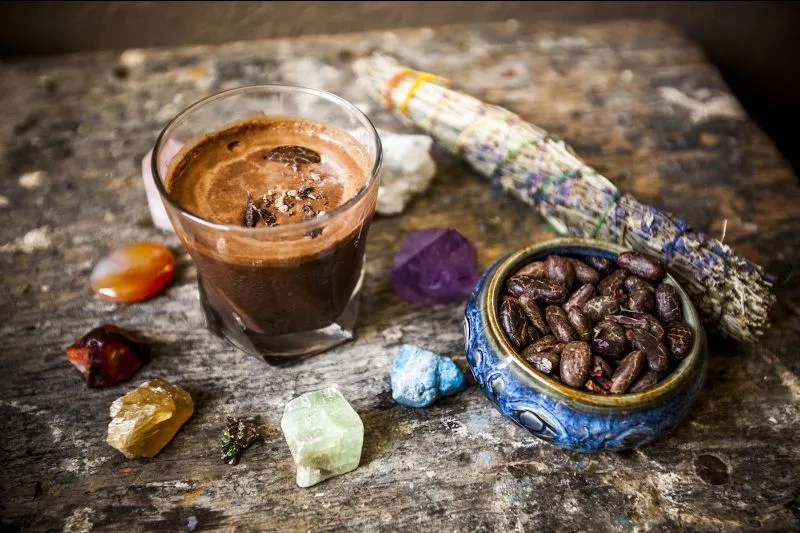Cacao Ceremonies: Ancient wisdom or New Age consumerism?
Bronwyn Rideout - 12th September 2022

How much would you pay to be led in a chant before drinking a bitter cup of cacao?
$33? $48? $55? $200 for a virtual, 2 hr ceremony?
Maybe you want to lift your game (and thicken your wallet) by becoming a certified Cacao practitioner? $1490, please.
Cacao is the raw, less-processed form of the cocoa that we know and love. It grows from Theobroma cacao trees that are native to South America, West Africa, and Asia. The journey from cacao pods to the cocoa powder sprinkled onto your flat white is a long one, but the point at which cacao becomes cocoa starts when the cacao nibs are ground up to create an alcohol-free liquor, from which cocoa butter is extracted. The remaining liquor is dried and ground into the cocoa powder that we use for baking, while chocolate bars are formed when the liquor is cooled and additional cocoa butter and sugar is added.
There is a lot of health food messaging around cacao, touting its higher level of nutrients than the more popular milk chocolate, and well meaning suggestions that you add cacao nibs into your trail mix instead of m&m’s. However, cacao and cocoa taste nothing alike; cacao is incredibly bitter, with a slightly nutty flavour. Lindt has a 99% cacao bar for sale in Countdown and New World if you wish to live a life without joy. The virtue signalling around cacao is akin to discussions around organic products, with the less processing implying that it is better to purchase, all while ignoring the exploitation of indigenous farmers and destructive farming practices driven by overseas consumer demands.
But I digress.
A cacao ceremony is a group activity that doesn’t have a rigid programme, although practitioners do include extras like dancing, yoga, and breath work based on their specialty. The ceremony’s purpose is to open your heart and release your trauma (amongst other health claims). The basic ceremony includes blessing the beverage, thinking about the energy or spirit you are calling in, drinking the beverage, and then some meditation/dancing/music. As best as anyone can determine, this is a completely ahistorical activity. While cacao and cocoa are important to the history and landscape of the regions from which they are farmed, with connections to Aztec and Mayan cultures particularly being especially played up, the origin of the cacao ceremony is unclear. Irish writer Aisling Walsh pinpoints the proliferation of cacao ceremonies to western countries beginning around 2018. Whether it is based on historical ceremonies specifically centred on cacao is unknown, and it is likely a modern concept.
This does not diminish the fact that cacao plays a part in the day-to-day activities of South Americans as a part of larger celebrations (i.e. weddings, baptisms, etc.), but it should call into question the authenticity of these activities when practised by overseas consumers. Clever marketing of “ceremonial-grade” cacao or claims to an ancient lineage aside, cacao ceremonies actually hang in a weird limbo: can you say something is culturally appropriated if it never existed in that culture in the first place? Similar to the selling of white sage, the exploitation of a culture for profit is more than distasteful, and ignores how the multitude of indigenous groups in South America were subjugated by Spain for centuries and their beliefs suppressed in favour of Catholicism. There is also a fair amount of brownwashing, where women of colour are present only in images of farming, while the artful photographs of cacao drinkers are white, even though this should be unusual since cacao is being presented as a sacred indigenous activity.
One article quoted a western practitioner who argued that most Americans had multiple ethnicities anyways, so not being part of a specific lineage shouldn’t be a barrier to practising; it wasn’t like they were diverting funds from indigenous communities, and she needed to pay for her studio space… which she needed to host the cacao ceremonies. A surprising source of support for (some) of this does come from individuals and groups who are from these communities or spiritual lineages. The Ruk’u’x Ulew women’s cacao collective in Guatemala is a business owned by mayan women; their position is that it is more important that people respect the cacao and honour the ancestral guardians of this plant. They don’t believe that only indigneous people should make cacao, but instead argue that it is more important for the cacao to be ethically sourced and that the funds are going to indigenous persons.
As it stands, the availability of cacao and the proliferation of ceremonies and Youtube playlists means that you don’t need to spend tens to thousands of dollars to drink bitter chocolate in a room full of strangers. You can enjoy the same benefits at a fraction of the cost by drinking coffee at home.